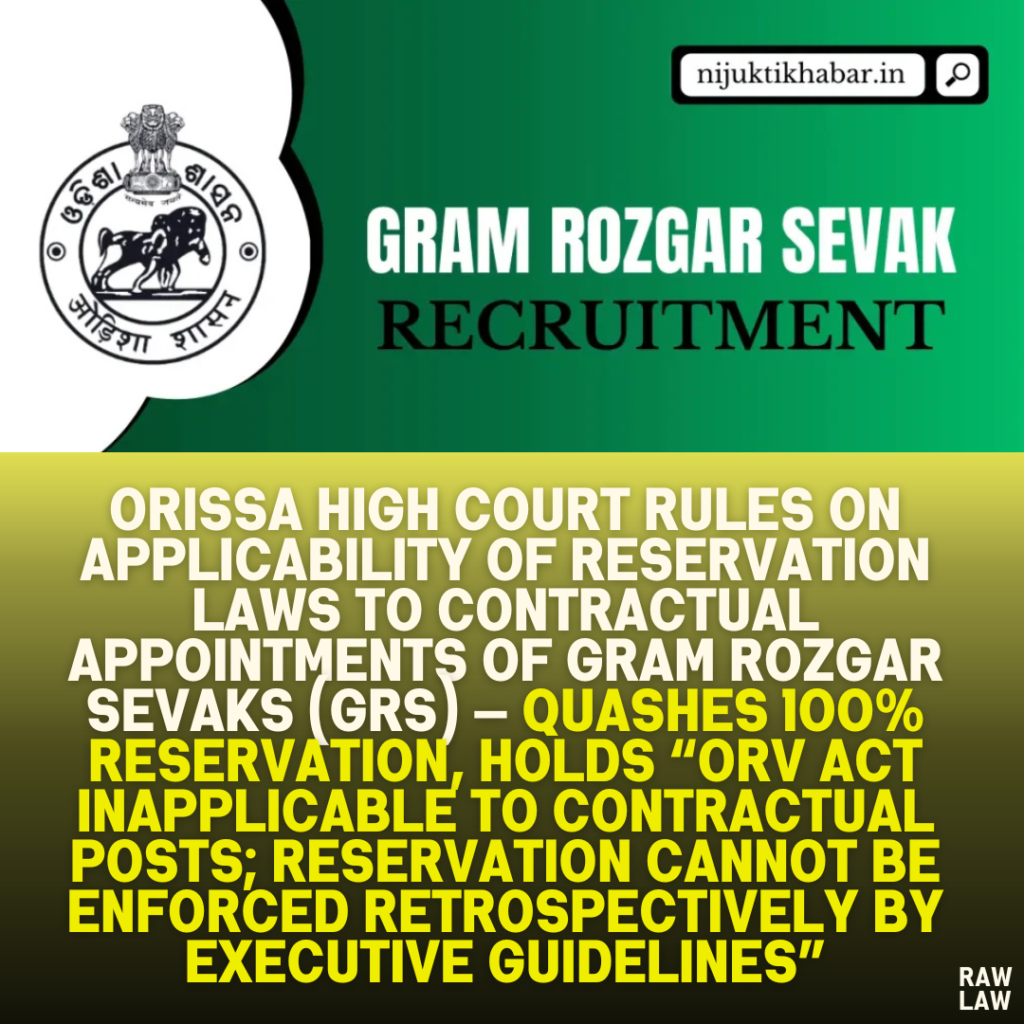Court’s Decision
The Orissa High Court quashed the comprehensive guidelines dated 06.04.2018 to the extent they mandated the application of the Odisha Reservation of Vacancies in Posts and Services (for Scheduled Castes and Scheduled Tribes) Act, 1975 (“ORV Act”) to the selection of Gram Rozgar Sevaks (GRS) under the Mahatma Gandhi National Rural Employment Guarantee Scheme (MGNREGS). It also quashed the advertisement dated 30.06.2018, which had provided for reservation in all 19 notified posts of GRS. The Court allowed W.P.(C) No. 13017 of 2018 and dismissed W.P.(C) Nos. 15082 of 2020, 21256 of 2021, and 29309 of 2022.
The Court held:
“The comprehensive guidelines dated 06.04.2018 in so far as it provides that the provisions of ORV Act and Rules framed thereunder would be strictly followed is hereby quashed.”
Facts
- On 30.06.2018, the Collector of Subarnapur issued an advertisement to recruit 19 GRS on a contractual basis under MGNREGS. All posts were reserved — 5 for SCs and 14 for STs.
- GRS is a contractual post, renewable annually based on performance and co-terminus with the Scheme.
- Guidelines dated 06.04.2018 stated that GRS would form a district cadre and be subject to the ORV Act.
- A petitioner challenged the reservation policy and classification of GRS as a district cadre post under the ORV Act.
- Three other petitions were filed by selected candidates seeking appointment orders under the impugned advertisement.
Issues
- Whether the ORV Act, 1975 can be applied to the contractual engagement of GRS.
- Whether GRS can be classified as a civil post or district cadre post to enable reservation.
- Whether retrospective application of reservation to single posts previously filled without reservation is valid.
Petitioner’s Arguments (W.P.(C) No. 13017 of 2018)
- GRS is a contractual post, not a civil post under OCS (CCA) Rules or the MGNREG Act.
- Section 3(d) of the ORV Act expressly excludes contractual posts.
- Reservation cannot be applied retrospectively to single posts.
- The guidelines dated 06.04.2018 violate Section 19 of the ORV Act which has overriding effect over administrative instructions.
Respondent’s Arguments
- GRS posts were originally single posts in each Gram Panchayat but were converted into a district cadre to ensure representation.
- There was under-representation of SC/ST categories, justifying the application of reservation.
- The creation of a district cadre gave legal validity to clubbed vacancies for reservation purposes.
- The selection was made under valid guidelines post-finance department concurrence.
Analysis of the Law
- The Court analysed Articles 16(4) and (4A) of the Constitution, emphasizing their enabling nature and that no one can claim reservation as a fundamental right.
- It reiterated that reservation must be based on legislative sanction, not executive orders.
- Cited the Supreme Court in Mukesh Kumar v. State of Uttarakhand (2020) 3 SCC 1: “Reservation is not a fundamental right. The State cannot be forced to provide reservation unless a law exists.”
- The Court reiterated that reservation is for “posts” and not “employees,” and cannot be applied retrospectively.
- Cited Post Graduate Institute of Medical Education and Research v. Faculty Assn., (1998) 4 SCC 1, holding that reservation for a single post results in 100% reservation, which is unconstitutional.
Precedent Analysis
- Mukesh Kumar v. State of Uttarakhand: Affirmed that reservation is not a right and cannot be enforced by individuals.
- Post Graduate Institute case: Reservation in a single post amounts to 100% reservation and is impermissible.
- Susanta Kumar Sethi v. State of Odisha (Orissa HC, 2021): Held that the ORV Act does not apply to contractual posts; Section 3(d) clearly excludes them.
Court’s Reasoning
- GRS is not a civil post under the OCS (CCA) Rules; it is contractual, temporary, and co-terminus with the Scheme.
- Clause 3(d) of the ORV Act excludes contractual posts from the purview of reservation.
- Section 19 of the ORV Act gives it overriding effect over executive instructions or guidelines.
- The formation of a “district cadre” for GRS posts is only a nominal classification and does not confer the status of civil service posts.
- Applying reservation to GRS via guidelines violates statutory limits under the ORV Act.
Conclusion
- The Court allowed W.P.(C) No. 13017 of 2018 and quashed:
- The portion of the comprehensive guidelines dated 06.04.2018 applying the ORV Act to GRS selection.
- The advertisement dated 30.06.2018 that reserved all 19 posts.
- The Court dismissed the writ petitions seeking appointments under the quashed advertisement.
- It directed that the advertisement dated 24.03.2021 be modified to invite applications without applying reservation.
Implications
- The ruling restricts the State from applying reservation policies to purely contractual posts such as GRS under MGNREGS.
- It reinforces the principle that executive orders cannot override statutory exclusions under the ORV Act.
- Any future reservation in contractual posts must be backed by legislative amendment rather than administrative guidelines.




Pingback: Supreme Court Acquits Murder Convicts Due to Misreading of Evidence and Procedural Lapses — "While the Court Ordinarily Does Not Reappreciate Evidence Under Article 136, It May Do So in Cases of Clear Misreading or Ignorance of Crucial Facts"